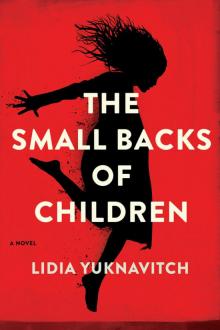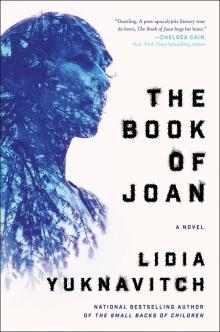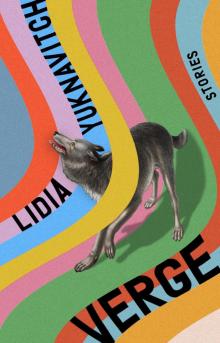- Home
- Lidia Yuknavitch
The Small Backs of Children Page 2
The Small Backs of Children Read online
Page 2
The forest is made of tunnels. Each tunnel opens into a deeper place in the woods, and the deeper she goes, the more surefooted she feels. Many times she has been hunting in these woods, and even as her mind is filled with cotton and electricity she knows she is far from alone. There are, for one thing, trees. And animals. Deer, rabbits, hawks, wolves. Ménuo, the moon. And Saulé, on the other side of the night, the sun mother, goddess of all misfortunates, especially orphans. And Aušrine, the morning star, and Vakeriné, the evening star.
And of course the rebel camps.
So when her legs have nothing left, and her skin is as cold as a dead person’s, it is fortuitous that she is knocked to the ground by a boy made into a man by war. She thuds thankfully in a small heap to the forest floor. He puts the long hard of his rifle against her throat, which she cannot feel. He shines a flashlight in her face. He smells of boy and rifle and dirt and sweat. She cannot see him and is glad. She makes her body limp, she makes her eyes dead, and then she loses consciousness, smiling.
When she wakes, she is inside a small makeshift tent. She is on the dirt of a floor, covered with blankets. Her feet and hands and cheeks feel very hot and they sting. A woman wearing the clothing of a man is petting her head, saying ssshhh. Almost like a mother. Drink this. She sees a submachine gun hanging from the woman’s shoulder, rocking slightly, accompanying the woman’s voice. In the corner of the tent, a man is being dressed in women’s clothing, his gun and knife at his gut being wrapped with scarves. Then she sleeps again.
The next morning the sun is there and the woman is gone, and there is the same manboy with a rifle standing over her. She can smell it’s true. He gives her a nudge in the ribs with his foot. Get up, he says. She gets up and finds that she is wearing heavy boys’ clothes. He hands her a pair of boots that have straw and leaves stuffed into them. Then he tells her that he and another man will take her to the edge of the forest. Do not cry, he says. You are lucky to be alive. Luckier still not to be in a Gulag, little pig. I said we should put you in a hole in the ground to watch for the enemy—you could squeal if you saw anything. If you cannot fight, you are nothing. I said we should use you as bait. He spits on the ground. Then he takes his dick out and pisses right near her feet. The steam rises between them. I said we should kill you. I don’t care if you live or die.
She is not scared. She can hear him and she concentrates so hard on his face and mouth she can feel her eyes become bullets. She wants the boots. Violently. She wants the coat—stained and torn and smelling of piss. He grabs his dick and moves toward her and she readies herself to go dead, but he just rubs it on her arm. Harder. Faster. The reddened muscle of a boy. She counts the dead air. Soon he comes in a hard hot spurt on the coat. She puts the coat on without hesitation, looking him in the eye. There is a scarf on the ground with some of his piss seeping into it that she would snatch up even if it were on fire. She wraps and wraps it around her head, covering everything but her eyes. She wants the pouch of dried-up bread, the canteen of dirty water, the broken knife. She wants everything he is giving to her.
They march her to the edge of the forest. They point to a spot across the whitened landscape. They say there is a farm there. From where they are, the spot looks like it could be anything. Or nothing. She begins to walk. She could be walking into a whitened oblivion. She wonders if they will shoot her after all. She thinks she hears them laughing. She turns only once to look back. He is pointing his rifle at her. She sees a wolf out of the corner of her eye, watching her, or maybe all of them, as it backs into the forest and she moves slowly forward, toward some unseen form in the distance.
The Writer
My daughter. Say it—hold it in your mouth, look at the words: born dead.
To be told there is no pulse at the precise threshold of birth—water breaking. To be told to deliver anyway. Death.
The day birth came at last, the labor had lasted two days. I nearly gave in. I kept thinking, To what end? It seemed true that at any point I could simply surrender to the pain of an ordinary body and . . . leave. I looked at the people around me—my eyes puffy, my skin done in—and thought, I love you, I love you all, enough, good-bye. But I did not leave, and the dead girl was born.
I expected her to be blue, and cold. Lifeless. I expected her to feel dead weighted. I expected to die, quietly and with soft breathing, from holding her.
But she was not blue, and she was not cold; she was like the weight of the history of love in my arms. Her skin was flushed and her eyelashes were very, small, long. Her lips were in the hue and shape of a rosebud. Her hair . . . she had a small halo of almost-hair. And her hands were curled in the shape of something tender and potential. I was holding life and death—those supposed opposites, those markers of narrative worth; a beginning, an ending—all at once in my arms.
I did not die.
But I could see the grief coming like a towering wave of water about to swallow the world. When grief comes, you must breathe underwater. I knew I didn’t have much time. You know, hospitals will not allow you to take a dead baby home with you. You must make arrangements, with the hospital or with a coroner or a morgue. They send in “grief counselors,” and, if you let them, god help you, clergymen.
I just wanted her body. I wanted her body more than I have ever wanted anything in my life. And so I did what I had to do.
I asked the poet—my lifelong rival, beloved friend, a borderline criminal—to steal her from that fucking place for me.
You will think it sounds impossible, but it was not. It was laughably simple. The poet was close friends with an attendant, an addict, at the morgue where I agreed to send her. The morgue had its own crematorium. In lieu of her lifeless body, a little pig covered in a soft blanket was sent down the metal road to the fire.
Instead, I took her to a place where a river empties into the sea. I drove there alone, with her perfect weight next to me in the passenger’s seat. I talked to her and sang to her and recited poems to her. When I got there—not anywhere anyone would be—I placed her in a backpack that also contained kindling and sage and waited for night. The wind was unusually still, and the surf had the rise and fall of breathing. The moon’s giant eye looked on. It was the end of an Indian summer. I removed my clothes. I held her body to mine for a long time. Until it came, the great flood. Animal sounds came from my throat. Nearly all of the night we rocked that way.
When a dead calm came over me, I made a pyre of sticks and sage and the only thing I had to give to her, my hair. All of it I could sever. Great clumps of American blond. I placed her body and my hair atop the pyre and lit it on fire. I watched her burn. I did not cry while she burned. The smell of burning skin and ocean and sage. I did not look away. I collected the ashes in the morning and walked into the sea with them. So there was a moment when we were together in the same waters.
Then I entered a cataclysmic silence, a white vast, for nearly a year.
After grief—strange sister self—left me, I thought, stupidly, that I could live my life, and love the artists who are in it, and carry on by writing. I gathered them together for meals, for art events, for films and readings and gallery exhibits. I thought I could narrate over everything. This . . . what I am still doing now. I am writing a journal of the girl. But I don’t know if I can withstand it. I hear my husband and son in the kitchen, making dinner, setting plates, and I close my eyes. My heart is beating me up.
I am an American woman writer. I am in the room I write in. The room with midnight blue walls. Dark red carpet against deep brown hardwood floors. Two windows with long off-white curtains. And books . . . books everywhere—on floor-to-ceiling shelves, on the floor, on the desk, piles of literature, art, photography, philosophy. The colors of their spines and covers the colors of skin, blood, fire, water, night. A black iron lotus Buddha with a broken hand that we glued back on—me and my husband, my now-husband. A good ironic metaphor. Various feathers from birds I have come upon: eagle, heron, crow, crane, and swan. Bowls of rocks. A photo. Th
e cat’s food bowl. Desperate talismans, the colors of blood and night and the bottom of an ocean. And the scent of someone over-saging a room because they are afraid they will make something to death.
I think things like, Be brave. Hold on to voice. It’s your only chance. Pick up the glass of scotch. Bring the amber liquid to your mouth. Drink. Large. Hold it there. Close your eyes. Move your goddamn hands before your mind makes a mess of it.
I see an image of a dead girl—an arrested image.
My breath jackknifes for a moment.
It’s the girl. I don’t know if she will kill me or save me.
Women and Children
The white is flat.
The girl does not look at her feet. She looks straight ahead, willing the shape in the distance to become the farmhouse they said it would be. The sky has smudged out the sun. Under each footstep she knows there is death: land mines and the graves of disappeared people. If she looks down it could kill her. Part of her wants to be blown to oblivion.
She is nothing but body: her legs and chest are burning, her jaw aches, her eyes swim in their little sockets. Then a farmhouse and barn emerge like ghosts before her; there is light in the window of the house. And another small forest—black-and-white-barked birch—on the other side of this place. She stops at the fence line and stares down. She sees her own breathing in white erratic gusts.
Little by little, her breathing eases. She can feel her tongue and teeth, her ears. She is at a crossroads: a child’s violent will to survive lodged in her chest where her heart should be, but an utter indifference along with it. Dusk is falling. She closes her eyes. When she opens them, she ignores the house and walks to the barn and chooses an empty horse stall next to a black mare. She finds a thick horse blanket, as worn and coarse as an animal’s skin. She buries herself in straw and the smell of goat, horse, pig, and chicken. When night comes, she is nothing more than an animal in a barn.
She doesn’t think about entering the farmhouse. For there is a woman in the house; she catches glimpses of her in the window at night. Her mind is on the eggs she sucked down raw. On the mason jars filled with root vegetables. On the milk she squirts from the goat’s teat into her mouth.
Next to the barn, she double-steps ten feet one way, then ten another, until she has walked out a square in the snow. With her broken knife she goes about clearing the snow away so that dirt and dried-up grass and thistles and weeds and rocks emerge. Then she digs. By the time the woman comes out of the house and spots her, she is all hands and concentration. She doesn’t even look up.
If the woman is thinking, Who is this girl, what is she doing, it has no effect on her digging. The girl is just fingers moving, nothing more.
The woman is stricken by the loss of her husband to a Siberian prison. Everything she sees has the same weight—next to nothingness.
She sees the girl when she gathers the eggs. She sees her when she feeds the animals. When she puts the horse in the field. When she milks the goat. She sees her each day, furiously at work on the ground. She sees her pile wood from the woodshed, cover it with kerosene, and light it on fire with matches from the barn. The two of them do nothing to care about each other. They take note of each other’s tasks and respectfully circle around them.
This happens for days.
The girl never comes to the door of the house; she never needs anything.
It goes like this. Six days, seven.
Then one day the woman is patching the roof and falls. The girl looks up for an instant, turning her small face to the falling. The woman’s body, then head, hit the frozen ground with a great thud. She is momentarily stunned. Then she opens her eyes and her body comes conscious. She has hurt her back, though not irreparably. She turns her head there on the ground and looks at the girl. For a moment, their eyes lock. Then the woman heaves herself up and goes in the house.
The next day the woman does not get out of bed.
In the dirt, the girl builds a forest surrounding the village, and begins the hard work of digging a trench for a river.
The next day, when the woman feeds the animals, she also brings the girl a jar of water, one half of a cooked cabbage, and a lump of sugar. She places it in a box just inside the barn.
Each day the girl builds more and more of the small village in the mud and snow and rocks and thistles. A small mound here for the center of things. The old church, the butcher’s, the small building where handmade paper was crafted, the store for ink and paint and pencils thick as a finger—pieces of charcoal in thin waferlike lengths or in rows like thumbs, oil paints she has dreamed of. She builds people with small bits of dead grass, twigs, little stones. Lining the streets. For trees, she uses pieces of the ends of trees. For walls, shale set upon its side. For the hills just outside the village, mounds of mud. Streets and bridges are made from pebbles and bark. For the sun, hay is wrapped and wrapped into a misshapen ball, set upon a hill, endlessly setting or rising. And for the photographer, the last person she saw before she shut out sight, a speckled stone.
By the time the girl’s eyes had risen to the fallen woman’s head on the ground, she was already lost in some other world. When their eyes met, the girl’s felt nothing. She turned back to her city of dirt and her hands caked with mud and continued her work. There is but one thing left to build and that is nearly unimaginable. Her house. Her father, a shattered starscape. Her brother, blown to bits like tinder. Her mother . . . she shuts out the image.
She flashes to another image, smaller, that lives between her ear and her jaw. It is an ordinary image, routine as a baker’s truck delivering bread, or a woman carrying her great bags of groceries from the market, a dog barking as she passes, a flock of birds lifting to the sky as hands in prayer. It is ordinary because that’s how memory replayed over and over again works—each act of remembering deteriorating the original and creating a memorized copy. It is herds of soldiers, the colors of stone or wall, lifting up from stone or wall as drawings taking on life, coming into motion, marching; the mud-thudding of boots and heels. It is the gray-green uniforms moving in unity, erasing human as if human were a smudge on a perfect black-and-white page all the shades of pencils. It is the faces of men passing by in rows and rows, the flesh changed color and texture to some thick putty ball plopped atop shoulders, the eyes black. It is bodies bludgeoned and the splatter of red onto the gray-green arms onto the stones of the gray street onto the gray walls; it is the bodies going limp as a fish brought to shore thunked on the head and rendered lifeless and dropped into the pile of the day’s catch; it is the almost-eyes from behind windows or doors not there and yet witnessing, it is the light—not night and not day, an in-between, not horror or joy, something without a name or place, something without a color. It is a mother and a father and a brother fading from color to ash, or a woman in a house mad with grief, her love lost to white, or just a child stubbornly representing a city in the snow.
Two casualties of war: childless mother and a motherless child, happening near enough to steal each other’s very breath.
On the ninth day the woman takes the food straight to the girl. She squats down on the ground. The girl immediately starts to point to her creations and name them. The woman nods. They eat carrots. When the girl is finished naming, the woman points to a smooth blue-gray stone, which seems to inhabit a forest of sticks.
Vilkas, the girl says.
Wolf.
On the tenth day, the girl finishes the city and enters the widow’s house.
The Photographer
Hello. It’s me. I wouldn’t write unless it was important.
It began with insomnia. When I lived in Ocean Beach. Remember O.B.? I was sleeping on the floor of some musician’s apartment. Pitch-black, lingering smell of pot, and all the things I thought would slow down and get better if I stepped out of my photojournalist life and into this . . . beautiful fantasy of a man’s life. Jesus. Look at him. He sleeps the sleep of the dead. Or of a clueless child.
I lifted
the sheet up and looked at my tits and my belly and it suddenly occurred to me, This witless manboy is in trouble. I could roll over and kill him with this middle-aged body—bloated and difficult to roll, laden and slow to sink when dropped in water. Every year a woman’s body degrades. Five pounds. Ten. Fifteen. Fuck.
What was I thinking when I got with him? Do you remember? That I would mother him? Me, a smarty-pants middle-aged childless overachiever? A maternal figure? Are you laughing yet? God.
I remember walking into his bathroom that night thinking, I’d go down on a dead man for some high-powered sleeping pills. And looking in the mirror. And nearly coronarying. What is it—this thing of a woman going from the drive and whir of her thirties into the thick and slow-bodied drag of her forties . . . is it just age that ages us? Or something else? I could feel the small feet of crows stomping around at the corners of my eyes. I could feel my ears growing longer, heavier, ridiculous. I could see my own nose growing for the rest of my life, changing my entire face, elongating it and drooping and dropping it as if everything about my face were becoming an enormous, bulbous fishing weight.
My head hurt. I heard a voice. The immensity of the image—larger than any systematized god or belief. Only the image, arrested, can liberate us from the lie which suggests that life tumbles forward toward some meaningful end. The arrested image is an artifact. When one stops the hegemony of life in motion, the truer fiction emerges. We are each simply an arrangement of particles of light, she said. We are none of us anything if not a glimpse of something fleeting and minuscule, weightless as air.
Photographs replace memory. Photographs replace lived experience. History.
The voice was mine.
The me that drives me to be something beyond a woman.
And I remembered who I was. And I knew I had to leave. So I grabbed my car keys and my camera bag and I walked out to my car and I left. Naked. Just like the night I left you in the desert, the only night of my life, I think, sometimes. My camera. Your body.

 The Small Backs of Children
The Small Backs of Children The Chronology of Water
The Chronology of Water Dora: A Headcase
Dora: A Headcase The Book of Joan
The Book of Joan Verge
Verge